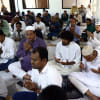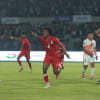Hamza, Shamit deserve a system, not just a jersey

Bangladesh's 2-1 defeat to Singapore in the Asian Cup Qualifiers wasn't just a defeat -- it was a missed opportunity to build something better with the right tools finally in hand. And that's exactly what former striker and Mohammedan's league-winning coach Alfaz Ahmed is talking about: we finally have the parts, but we don't know how to assemble the machine.
For the first time in years, the Bangladesh team have access to quality midfielders in Hamza Choudhury and Shamit Shome -- players with international pedigree and the technical capability to dictate play. Yet, on the night it mattered, they were left stranded, victims of a system that failed to support them.
"Hamza found the ball but whom he did he get to play it to?" Alfaz asked, bluntly summing up the disjointed midfield.
It's a valid point. You don't bring in a Leicester City-bred midfielder like Hamza just to recycle possession sideways or to rely on individual hustle. You bring in players like him and Shamit to control the tempo, launch transitions, and create space for attackers. But what was witnessed instead was tactical confusion -- a midfield too narrow, wingers isolated, an attack that lacked punch, and overall a pattern of play that went missing.
This wasn't just about underutilising individuals. It was about wasting a system's potential. Alfaz pointed to the lack of width, where left-footed Sohel Rana could have unlocked the left flank. Instead, the team became lopsided. While Hamza funnelled most passes to the right, Mohammad Ridoy offered no support on the left, cutting the field in half -- limiting options, and predictably, Bangladesh's threat.
Then there's the question of selection. Alfaz questioned the omission of Taj Uddin, who had impressed against Bhutan. The same goes for Sohel, another performer option wasted in a rigid 4-2-3-1.
Let's be honest -- what was Bangladesh's game plan? Sit deep, defend, and maybe pounce on a counter? That strategy collapsed within 45 minutes.
"The defensive organisation was also not good because the defenders should close down the shooting space of Singapore's unmarked No. 7 while we conceded the first goal. There were no steps to go follow-through after the goalkeeper punched the ball," Alfaz noted. The first goal, a simple failure in defensive tracking, said it all.
But beyond tactics, there's a psychological weight the team carried. Expectations were sky-high at home. The stadium was packed. The fans were ready. And yet, the players looked more burdened by the occasion than inspired by it.
"High expectation was another factor," Alfaz said. "They played all out only after losing everything."
It's the oldest problem in football: pressure without purpose. Instead of setting up the team to play to its strengths -- midfield control, width, pace on the flanks -- we boxed ourselves in with conservative decisions.
And here's where Alfaz hit hardest: What's the point of having overseas talents if they're not used effectively? The entire narrative around Bangladesh's football "turnaround" revolves around the inclusion of foreign-born or foreign-trained players. If they're shoehorned into outdated systems or asked to play roles that negate their strengths, then we've learned nothing.
Hamza and Shamit can be game-changers. So can Rakib Hossain, Faysal Ahmed Fahim, and Fahamedul Islam, if they get the ball in the right spaces. But none of that matters if the coach doesn't build a system that gels them together and brings the best out of them.
If Bangladesh want to dream of getting into the Asian Cup after 47 long years, the time for safe football is over. It's time to play smart, play bold -- and most importantly -- play to the team's strengths.
Otherwise, it's just dressing up talent in red and green jerseys and asking them to fight with one hand tied behind their back.

 For all latest news, follow The Daily Star's Google News channel.
For all latest news, follow The Daily Star's Google News channel. 








Comments